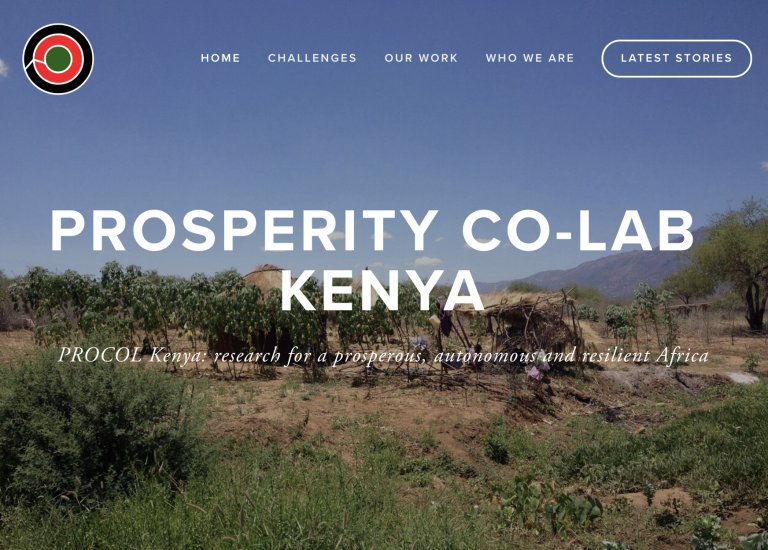PROCOL Kenya website launched
31 October 2018
The IGP's Prosperity Co-Lab (PROCOL) Kenya website has been launched

PROCOL Kenya website
A new website for Prosperity Co-Lab (PROCOL) Kenya today goes live ahead of the PROCOL Kenya project launch this Friday 2nd November 2018.
PROCOL Kenya is a programme of collaboration, research and partnership, with invited stakeholders from Kenyan national and county governments, international organisations, Kenyan Universities and local community groups.
This website will be a home for our work with PROCOL Kenya, covering news, events, research and more.
Friday 2nd November 2018
Invite only
On Friday 2nd November 2018 we will launch PROCOL Kenya as a partnership with multiple stakeholders from Kenyan national and county governments, international organisations, Kenyan Universities and local community groups. PROCOL Kenya will begin by mapping out a new paradigm for sustainable ecological management and future rural livelihoods, based on a re-valuing of nature and the concept of Natural Prosperity. Drawing on IGP's Prosperity Metrics work from elsewhere in the world, we will re-map metrics of well-being and quality of life on to measures of environmental quality, linking these explicitly to the Sustainable Development Goald (SDGs) and the four pillars of Kenya's Vision 2030. Our aim is to rethink the delivery of the SDGs and Vision 2030 in light of climatic and demographic change and in ways which are resilient, sustainable and both socially and environmentally just.
Saturday 3rd November 2018, 10:00 - 15:00
Please register for this event here
The event
This workshop explores common misconceptions between scientific, institutional and public understandings of climate change and examines how more effective methods of communication and behaviour change may be developed. It focuses on sharing knowledge and approaches across the sciences, and on breaking down differences of understanding.
The workshop will focus on three panel discussoins with leading UCL, UK and East African figures. Panellists will present short "think pieces" designed to stimulate debate with the audience.
Attendance is open to all on a first-come-first-served basis.
Why this workshop?
Africa is generally recognised as the continent most vulnerable to the impacts of climate change. Understanding and responding to these vulnerabilites requires knowledge and cooperation across sectors, disciplines, institutions and diverse audiences. Effective climate research must engage with policymakers, businesses and different public groups.
However, genuinely trans-disciplinary perspectives and research teams remain rare, especially in sub-Saharan Africa. Regional understandings of the nature and impact of climate change remain limited with local academics and policymakers often lacking the research data and tools to inform effective responses. Current drives towards change are often led by disconnected, project-level approaches with disconnected funding agendas. In addition, environmental science in sub-Saharan Africa has at times been associated with top-down and repressive policies and practices which marginalise African citizens.
Climate change knowledge, capacity and responses remain patchy.
Future responses to climate change must avoid longstanding associates between science and colonial/post-colonial power dynamics. There is a need for fresh approaches that involve the co-production of knowledge and action across the sciences, with stakeholders from government, civil society and business. Communicating the nature of research and developing common understandings of climate change are essential to this.
This event will be run by Professor Jacqueline McGlade, Dr Matthew Davies, Dr Freda M'Mborgori, and Professor Henrietta Moore. It is being organised by the Institute for Global Prosperity, UCL and the British Institute in Eastern Africa, with funds from the UCL Global Engagement Office.
 Close
Close

